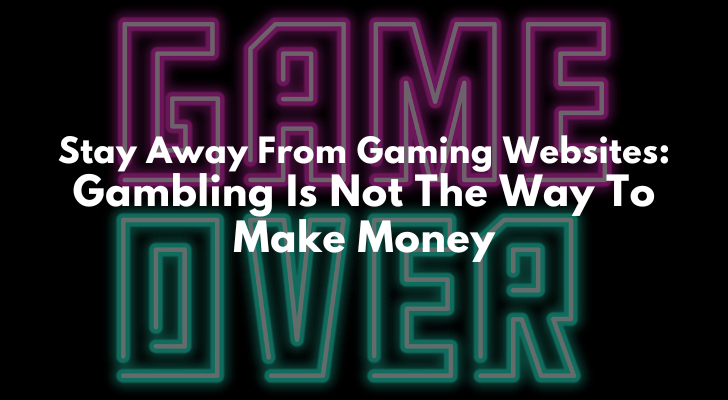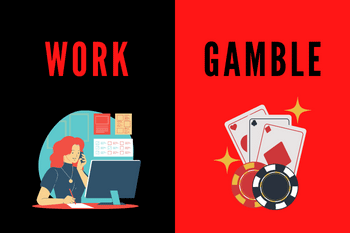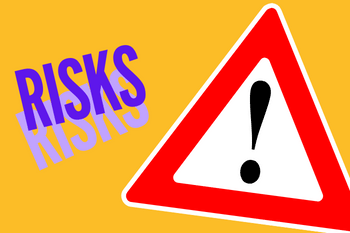Gaming/gambling has become increasingly popular in recent years, with online casinos and sports betting sites popping up all over the Internet. With the slight potential to make a quick buck, this industry is often seen as an easy way to make money.
But we all know that this form of entertainment is never a reliable or sustainable way to generate income. If you become an affiliate of a gaming site, you should make it clear that the site can put users at financial risk if they are not careful. Really, all gambling websites should be avoided if you're looking to genuinely make money.

Did You Know?
Facts about Gambling Addiction
- Global Issue: Gambling addiction affects millions worldwide, with prevalence rates varying by country.
- Brain Impact: Similar to substance abuse, gambling addiction can rewire the brain's reward system, leading to dependence.
- Mental Health: Gambling addicts often suffer from concurrent mental health issues like depression and anxiety.
- Financial Ruin: Compulsive gambling can lead to significant financial problems, including debt, bankruptcy, and theft.
- Relationship Strain: Addiction can strain relationships, leading to isolation, divorce, and loss of trust among family and friends.
- Youth Risk: Young adults are at a higher risk of developing gambling problems, partly due to the prevalence of online betting.
- Suicide Rates: The rate of suicide attempts among gambling addicts is higher than in the general population.
Most Gaming Affiliates Are Scammers
Gaming affiliates are everywhere these days. It’s easy to be lured in by the promise of quick cash, but often times these promises turn out to be too good to be true. Most gaming affiliates are nothing more than scammers looking to take advantage of unsuspecting gamers. In this blog post, I will dive into some of the most common types of fraud and how you can spot them before they cause any real damage. I'll also provide some tips on how to protect yourself from scams and how to tell if an affiliate program is legitimate or not.
The Difference Between A Good Affiliate And A Bad Affiliate
A good affiliate is someone who is upfront about their business and most certainly doesn’t try to mislead people. A bad affiliate is someone who is always looking for shortcuts and trying to game the system.
Good affiliates are also transparent about the fees, terms, and conditions. They don’t try to hide anything from their potential customers. Bad affiliates, on the other hand, will often try to trick people into signing up for their programs by not being forthright about the terms of the agreement.
Did You Know?
Prevention Strategies
- Education: Raising awareness about the risks of gambling and understanding the odds can help prevent addiction.
- Limit Exposure: Restricting access to gambling opportunities, especially online, can reduce the risk of addiction.
- Financial Management: Teaching and implementing financial management skills can prevent the spiral into gambling debt.
- Support Systems: Encouraging strong social support networks can help at-risk users resist the temptation to gamble.
- Self-Exclusion Programs: Many gambling sites and casinos offer self-exclusion programs allowing users to voluntarily ban themselves.
Why Many Gaming Affiliates Are Scammers
If you're new to the world of online gaming, you might be forgiven for thinking that all gaming affiliates are legitimate. Unfortunately, this is far from the truth. In reality, a lot of gaming affiliates are scammers, and they're preying on unsuspecting gamers who are looking for a way to make some extra money. Here are a few reasons;
- The gaming/casino affiliate business model can be rife with fraud. There are a lot of unscrupulous people out there who are looking to make a quick buck, and they're willing to lie and cheat to get it.
- The gaming industry is unregulated, so there's no one watching out for gamers who might be getting scammed by an affiliate.
- Many gaming companies don't have the best interests of their players at heart - they're more interested in making a profit than in providing a fair and fun gaming experience for their customers.
So if you're thinking about becoming a gaming affiliate, beware - you could be setting yourself up for disappointment (and a loss of trust) down the road.
How To Avoid Being Scammed By A Gaming Affiliate

On the other hand, if someone recommends you join a gaming program, you should be alerted.
Most people who get into the gaming affiliate business do so because they love games and think it would be cool to get paid to recommend games to others.
However, the sad reality is that most of them use words such as;
- “Profits”,
- “X amount daily”,
- “The biggest payout I’ve ever seen”, etc.
And as you know, where there is a potential profit, there’s also a potential loss.
There are a few things you can do to avoid being scammed by a gaming affiliate:
1. Google the name of the company and also the name of the affiliate marketer.
Check the company and the person running it. See if there are any complaints or negative reviews online. Check if whoever recommends it is the real person or if their identity is hidden.
2. Ask questions and see how they answer.
If you have any doubts or concerns, don't be afraid to ask questions. A legitimate affiliate will be happy to answer any of your questions in a helpful way. If their answer or abrupt or too optimistic (“I’m making a huge profit daily”, for example), then stay away.
3. Keep records.
Keep track of all communications you have with the affiliate, including emails, chat logs, and Skype calls. This will help you protect yourself if there's ever a dispute over payments or other issues.
4. Watch out for red flags.
There are some common warning signs that an affiliate might be a scammer: promises of guaranteed income, pressure to buy advertising, requests for personal information upfront, etc. If you notice any of these, it's best to avoid the program.
Did You Know?
Gaming Scams
- Fake Websites: Scammers create fake gambling sites that appear legitimate to steal money and personal information.
- Rigged Games: Some unscrupulous sites rig games to ensure users never win or cannot cash out their winnings.
- Bonus Scams: Offers of free cash or bonuses are sometimes used to lure users into depositing money on fraudulent sites.
- Identity Theft: Personal information provided to gambling sites can be used for identity theft and other fraudulent activities.
- Phishing Emails: Scammers send emails posing as legitimate gambling sites to trick users into revealing sensitive information.
The Line Between Work and Gambling Online

This is more obvious than anything. Work is something that you do to earn money. Gambling is something that you do for entertainment.
With the former, you get rewarded for contributing your effort to help others. But with the latter, it’s all about you and money. There may be some strategies but gambling is often based on chance and you mostly rely on your intuition. There's no real monetary reward at stake.
No matter how skilled you are, the outcome of the game can never be guaranteed. This isn't the case with work; your skill and effort will generally determine how successful you are.
Gambling can also become addictive and lead to financial ruin. It's important to gamble responsibly and know your limits. Work, on the other hand, is a necessary part of life that can provide you with a stable income.
Did You Know?
Additional Considerations
- Legislation and Regulation: The regulation of online gambling varies significantly between regions, affecting the availability and legality of gambling activities.
- Blockchain and Cryptocurrency: The rise of cryptocurrency in online gambling has increased the risks of scams and fraudulent activities.
- Professional Help: Addiction treatment programs, counseling, and support groups like Gamblers Anonymous can be effective in overcoming gambling addiction.
- Technology Solutions: Software solutions that block access to gambling websites can help those who are struggling with gambling impulses.
“Make Money Online” - Don’t Get Confused
Sometimes, when beginners look for “make money online” products, they forget the line between work and gambling and wrongly search for anything based on “making money”. Here are some factors to help you decide if something is a gamble or not:
- The odds of success: If the odds of success are low, it's more likely to be a gamble.
- The potential payoff: If the potential payoff is high, it's more likely to be a work.
- Your personal risk tolerance: This is a big one. If you're not comfortable with taking risks, then anything with a chance of failure is going to feel like a gamble.
- The downside: What's the worst that could happen? If the downside is losing money or time, it's more likely to be a gamble. But if the downside is potentially life-changing (or even deadly), then it's definitely work.
Taking Risks For Your Business

Taking risks for your business’s sake is different from gambling.
With a business, by taking risks and putting yourself in new situations, you can learn more about your capabilities and what you're really capable of. It can also help you build self-confidence. When you face your fears and conquer them, it can give you a major confidence boost.
By taking risks, you can improve your problem-solving skills. When you're constantly faced with new challenges, you learn how to think on your feet and come up with creative solutions. This is an essential skill in both personal and professional life.
And of course, one of the most enticing benefits of taking risks is the potential for rewards. While there's always the possibility of failure when taking risks, the potential rewards are often much greater than if you play it safe.
You will learn more about yourself - If you're looking to achieve something big in life, taking risks is essential.
But taking risks and gambling are two totally different things.
Working Online Means Making Someone Smile
Newbies who try to make money online tend to forget this simple fact - if you make money, that means someone pays for it. Someone pays money means they are happy with what they receive. You making money means making someone smile.
If you really want to start gaming affiliate marketing, make this clear. You are going to make users smile for entertainment reasons. Not by giving false hope that they can make a lot of money. By doing this, you are potentially going to wreck someone’s life.
That will define whether you're going to be legit or a scammer.
Supercharge Your AWeber Account
Take Your Email Marketing To The Next Level With These Powerful Tools
If You Really Want To Become a Gaming/Gambling Affiliate
When it comes to affiliate marketing, if you really love spending money on playing games and all the know-how, it may be a good idea to become an affiliate and promote your recommended game sites.
But don’t forget that your recommended products are there to keep them entertained. If a product/program does not involve extra money, it’s good, but if it requires them to top up over and over again, you are potentially making them addicted to gambling.
You should also be aware that there will be a lot of restrictions. Some web hosting companies and email marketing services don’t allow you to promote gambling-related niches. Google doesn’t allow them to use their Adsense ads on your site.
Find Legitimate Ways To Make Money Online
You should be careful when you're looking for ways to make money online because there are a lot of scams out there. Don't trust any promises that give you rewards but don’t explain how the money is generated. If someone simply says that you can make a lot of money quickly and easily, they're probably trying to take advantage of you.
Here are some tips for finding legitimate ways to make money online:
- Check who the customers are. When you find a program, be clear about what kind of service it provides and who pays for it (so that you can get paid for what you work for.)
- Look for reviews. If you're considering signing up for a program or service, look for reviews from other people who have used it.
- Be cautious with personal information. Don't give out your personal information to anyone unless you're sure they're legitimate.
- Beware of promises of easy money. If something sounds too good to be true, it probably is.
- Use common sense. If something doesn't feel right, don't do it.
Conclusion
There are far more suitable and reliable ways to make money other than trying to persuade people to gamble. As a genuine affiliate marketer, it’s best to stay away from gaming/ casino niches. Make sure the program your recommend is transparent about its terms and conditions, verify they have good reviews from previous customers, and never trust anyone asking for up-front payments or excessive personal information before signing up. Then you should be able to avoid any potential scams.
If you are new to affiliate marketing at all, the bottom line is that gambling does not guarantee success or even break-even results versus losses - so stay away from gambling websites!

